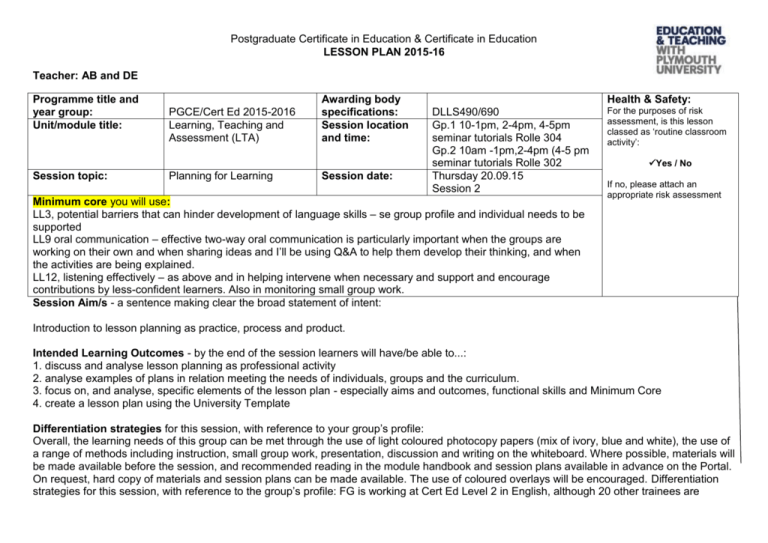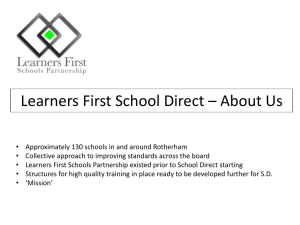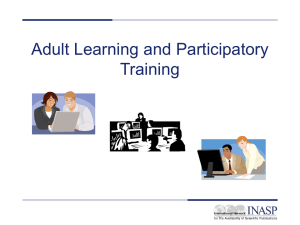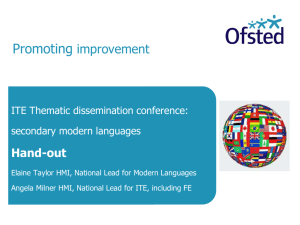2015 16 Example lesson plan
advertisement

Postgraduate Certificate in Education & Certificate in Education LESSON PLAN 2015-16 Teacher: AB and DE Programme title and year group: Unit/module title: Session topic: PGCE/Cert Ed 2015-2016 Learning, Teaching and Assessment (LTA) Planning for Learning Awarding body specifications: Session location and time: Session date: Health & Safety: DLLS490/690 Gp.1 10-1pm, 2-4pm, 4-5pm seminar tutorials Rolle 304 Gp.2 10am -1pm,2-4pm (4-5 pm seminar tutorials Rolle 302 Thursday 20.09.15 Session 2 Minimum core you will use: LL3, potential barriers that can hinder development of language skills – se group profile and individual needs to be supported LL9 oral communication – effective two-way oral communication is particularly important when the groups are working on their own and when sharing ideas and I’ll be using Q&A to help them develop their thinking, and when the activities are being explained. LL12, listening effectively – as above and in helping intervene when necessary and support and encourage contributions by less-confident learners. Also in monitoring small group work. Session Aim/s - a sentence making clear the broad statement of intent: For the purposes of risk assessment, is this lesson classed as ‘routine classroom activity’: Yes / No If no, please attach an appropriate risk assessment Introduction to lesson planning as practice, process and product. Intended Learning Outcomes - by the end of the session learners will have/be able to...: 1. discuss and analyse lesson planning as professional activity 2. analyse examples of plans in relation meeting the needs of individuals, groups and the curriculum. 3. focus on, and analyse, specific elements of the lesson plan - especially aims and outcomes, functional skills and Minimum Core 4. create a lesson plan using the University Template Differentiation strategies for this session, with reference to your group’s profile: Overall, the learning needs of this group can be met through the use of light coloured photocopy papers (mix of ivory, blue and white), the use of a range of methods including instruction, small group work, presentation, discussion and writing on the whiteboard. Where possible, materials will be made available before the session, and recommended reading in the module handbook and session plans available in advance on the Portal. On request, hard copy of materials and session plans can be made available. The use of coloured overlays will be encouraged. Differentiation strategies for this session, with reference to the group’s profile: FG is working at Cert Ed Level 2 in English, although 20 other trainees are working at confidently at degree Level 3. JJ finds academic reading and writing a challenge and has Additional Learning Support (ALS) outside of the teacher training course programme in order to be able to meet coursework deadlines – so I will make sure JJ leaves with a full set of notes. FDR - although has an A Level in English this was gained some time ago – she is a mature art based trainee and although exemplary in her teaching practice is not confident in her academic abilities, although she is able – I will try to point out her strengths to help build her confidence and I will pair her with HRH during the paired exercise as both parties may benefit from working together. LB has suffered a recent bereavement and we have agreed she may just get up and leave early should she need to. Opportunities for promoting equality and recognising diversity How you will embed Functional maths, English, ICT and employability will be addressed by: skills for learners to develop in the session: There will be opportunities for discussions on how to create inclusive This session offers the opportunity to embed English when learners are lesson plans to cover a range of learner needs and the importance of contributing to discussions in a range of contexts, including those that may planning in meeting issues of equality. Policies will be identified and be unfamiliar, and when presenting their own ideas. They’ll need to be able trainees encouraged to familiarise themselves with College policies to persuade the ‘audience’ and contribute to ideas and suggestions from and practices. other groups. They will also be note-making and note-taking and this can be developed as a study skill within the session. Links can be made between planning and effectiveness as a teacher in the classroom can be made as well as the usefulness of a good lesson plan in supporting colleagues (if they ever have to step in), or even for interviews in the future. How will outcomes of learning Resources Time Content, Teacher activity Learner activity be assessed? Objectives How do you and learners know learning has taken place? 10.00 Register Welcome and take register Active listening Register Attendance. Moodle module handbook/information 10.10 Recap session 1 Facilitate Write up key points from yesterday’s session. State further thoughts and questions Divide whiteboard into three key points, questions, targets set. Check what trainees have understood using Q&A. Quality of questions. Targets for PP/RDP 10.30. Professional standards related to planning Planning to meet the needs of learners Didactic exposition Listening Q/A note making Professional Standards Informally, monitor by observation, attentiveness. Didactic/facilitative. Impact of teaching strategies on the learners What does the plan expect the learners to learn Small groups to critically analyse a lesson plan from three perspectives. 1. The individual 2. The whole group 3. The curriculum/syllabus Sample lesson plan (this plan and sample below) Formatively: ability to work together 10.40 What interactions planned for between students (ground rules) 11.00 Plenary Facilitate groups sharing questions From your analysis create a list of questions… Each group to try and answers each other’s questions, Offer ideas for ground rules. 11.15 11.45 COFFEE BREAK Continue analysis of areas of lesson planning COFFEE BREAK COFFEE BREAK Brief introduction to other sections on plan such as: Aims and outcomes 12.15 Focus on Functional skills and minimum core Facilitate using interactive lesson plan to discuss policies on Functional Skills. Active listening followed by analysis of plan focusing on: Aims, outcomes, differentiation, scheme, record keeping…) Active listening and note making followed by discussion of own skills. 12.45 Plenary 1. Recap and facilitate any final questions. 2. Prepare for afternoon activity writing a lesson plan Active listening and engagement 1.00 2.00 LUNCH Creating a lesson plan. LUNCH Facilitative activity. Repotting a tomato Trying on a space suit. 3.00 Review of plans created Facilitate group feedback LUNCH Groups three create a 30 minute lesson plan on a chosen topic. Use notes from this morning’s session. Each group to discuss a section of the plan 3.40 Recap 3.55 Guided study: Bring an assignment brief and marking criteria from your practice. Each group to recap one elect Check through our Aims and at a time until all have been Outcomes (Atherton at www.learningandteaching.info ) covered. Note make and consider targets to discuss with their mentor Note make Reminders Trainees own questions. Monitor interactions between each group. COFFEE BREAK Sample lesson plans COFFEE BREAK Formatively: offer feedback on progress and questioning for further development of ideas. PP/RDP Targets Simons interactive lesson plan (Lesson Plan with Guidance) Quality of questions asked and answered by group. LUNCH Lesson plan List if blooms taxonomies (hand outs) LUNCH Active engagement and use of new terminology Active engagement and use of new terminology Interactive lesson plan – Moodle (Lesson plan with Guidance) Informally but summatively, through quality of understanding and ability to recall and recap session. Handbooks Summatively: will be evidenced in Professional Portfolio, planning examples etc, due for submission 11.11.15 Your evaluation of session, in discussion with your mentor e.g. learner achievement of learning outcomes effectiveness of learning resources, learner feedback on lesson, the way in which you have used your own minimum core knowledge and skills to enhance your learners’ English, maths and ICT, the Professional Standards addressed (with particular focus on elements 9. and 10.) and, any unplanned opportunities you took to promote equality and recognise diversity within your evaluation: As always, this is an intense programme and concentration is needed on this new subject of lesson planning, especially where the material is pretty challenging, such as writing aims and learning outcomes. GD arrived very late, 12.15 pm, so this was a little disruptive and time was lost in catching him up, and because of the distance he travels he was unwilling to agree to stay at the end for 15 minutes to find out what he had missed; this is not fair on the others, and I need to think of ways to minimise this problem. By contrast, FG had been absent last week, but had read all the materials and done all the tasks I had e-mailed the following day, and was ready for this session. There was some resistance to the idea of the guided study task, although several had already had meetings with their mentors on assignment briefs, which was clearly beneficial. The section where groups discussed their lesson plan was probably ‘overkill’, as the lesson had been quite hard work already, so creating a plan and then presenting a section linked to the learning outcome 4 was over-ambitious due to time constraints. They definitely achieved the first 3 learning outcomes though. Everyone contributed to the discussions, and FDR in particular made many helpful contributions. I made sure that FDR was working with HRH, and they also worked with JJ so that he left with good quality notes on lesson planning with hand-outs so that he could practice further on elements of lesson planning well. In terms of prof standards 9. and 10., the room layout suggested by Petty was useful and seems to have been effective, and asking the groups to summarise so that they reiterated the content has helped to identify areas that can be followed up next week (as recall, repetition and consolidation). The group enjoyed the relevance of discussing Bloom’s taxonomies in lesson planning and 2 commented that the module was turning out more interesting than they had expected! Talking to colleagues after the session progress appears to be good, but still some concern for LB. Asking the groups to make links to the forthcoming submission helped to contextualise some of what was covered and make links between today’s content and their own practice. Your targets identified for future sessions (to transfer to Reflective Development Plan): 1. 2. 3. 4. Design & produce and ask trainees to bring in examples of lesson plans from trainees’ mentors. Link all lessons more clearly to assignment brief. Monitor GH continual lateness as this may be a cause for concern Having spoken with colleagues I will now also note LB’s attendance/absences and ask the tutor to follow up in case they need additional support through an Early Alert.







